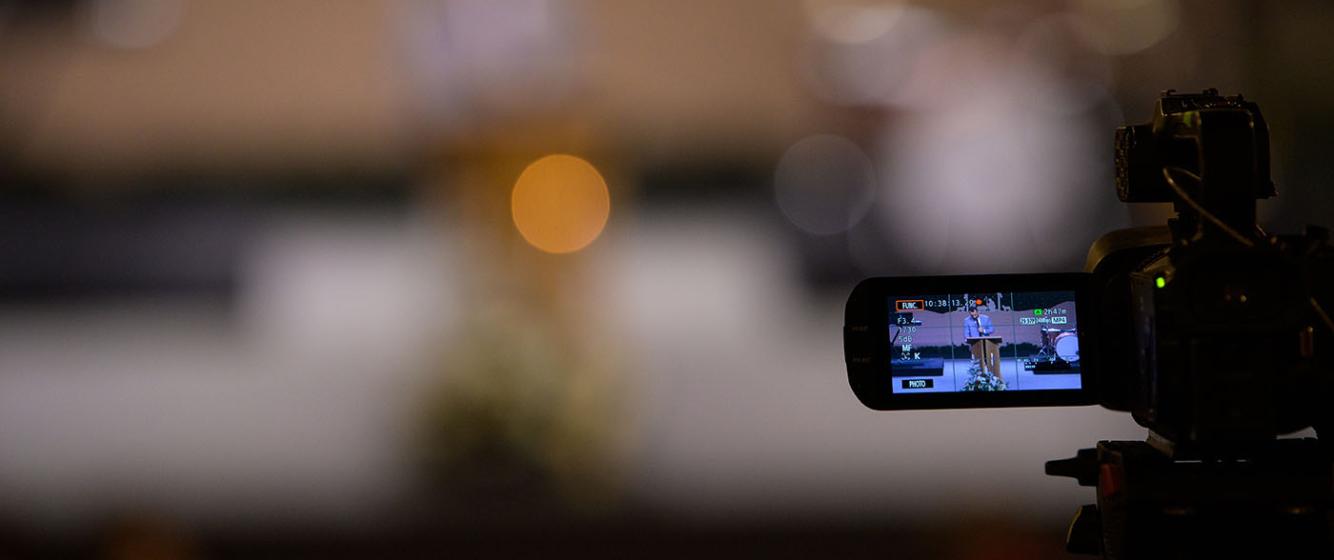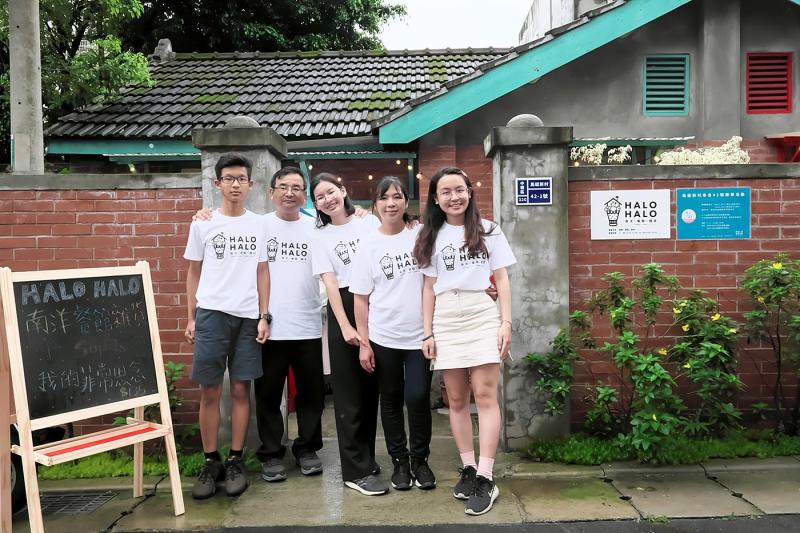
Being a ‘Slashie’ to Make Taiwan a Society of Equality: Second-generation/Graduate Student/Film-maker/Restaurant Owner/Radio Host
The following narrative was constructed by Hsin-Chin Evelyn Hsieh, based on an interview that she conducted with Chia-Ching Tsou, a cultural producer and fonder of Halo-Halo in Taiwan.
I am Chia-Ching. My mother is Filipino and my father is Hakka Taiwanese. My family has been unique since I was born. My father works in the Philippines and my mother is a housewife who takes care of us in Taiwan. I have another family in the Philippines and we often go back to visit them. They are very expressive: they say ‘I love you,’ hug and treat you well. This is quite different from the situation in my Taiwanese family. The uniqueness of my family is indescribable and generates the perception that ‘you are not as the same as us’, something I realised after entering school. For instance, my aunts and cousins have pierced ears with earrings, which is common in the Philippines. I told my grandmother that I would love to have my ears pierced too. Although we cannot communicate in Tagalog, my grandmother cut paper into a star or heart and put it on my ears. Afterwards, I asked my mum to let me pierce my ear and she consented and took me to a clinic. I was nervous and screamed during the piercing. However, I felt happy and had a sense of belonging after it was done. Henceforth, I was part of the Philippines, although my father was angry about my pierced ears. My parents fought due to cultural differences.
During my schooling, I noticed that my lifestyle and language were different from those of others. Taiwan’s education system is exam-oriented and encourages everyone to become a straight-A student. Back then, society was hostile to outsiders and mass media portrayed foreign spouses negatively, reporting that they came to Taiwan through brokers for money. They made out that they might run away and send money back to their natal families. They reiterate that they should not be given money, be allowed to go out, or be offered space and freedom. I grew up in this environment and wondered why others saw my mother in this light. It is difficult to conceal her Filipino identity due to her long name, Tsou Hsieh Hsie erh ta. The people around were curious. ‘Your mother is a Filipino. Can you speak Tagalog?’ I spoke a few words, and they replied, ‘It is difficult and weird’ and walked away immediately. I was stunned and realized that everyone had stereotypical preconceptions of the Philippines and marriage migrants. Ever since, I have been reluctant to explain and talk about my background.
I worked part-time on my uncle’s food stand when I was in senior high school. It was located near a Catholic Church in Chungli, Taiwan, so many Filipino migrant workers came there. They assumed that I could not speak Tagalog, but I tried to call them ‘kuya’ or ‘ate,’ both meaning ‘brother or sister’ in Tagalog. They were amazed and I felt a sense of achievement at speaking Tagalog in Taiwan. I did not learn Tagalog intentionally, and my mother did not teach me either. When I went back to the Philippines for two months every year before the pandemic, nobody could speak Mandarin. Therefore, I learned Tagalog naturally during those visits. I felt ashamed of not being fluent, but my mother has always been supportive. I would love to focus more on issues such as the equal rights of new and second-generation immigrants. Some second generations may question their Filipino identities because they are unable to speak Tagalog. However, I do not believe that this notion is accurate. Beginner-level expertise was adequate for me to communicate with my Filipino family.
In 2018, I shot a documentary called ‘Home: 2340 km Root-Seeking Journey,’ which told the story of Auntie Lita and her family’s homecoming to Batanes Island, Philippines. Before the shoot, I did some preparations and fieldwork, visited friends in Orchid Island, and consulted Dr Cheng-Hsieh Yang, whose expertise lies in the Batanes Island. I also contacted documentary film-makers Tsung-lung Tsai and Kim Hong Nguyen, and visited their cultural space, ‘Khuôn viên văn hoá Việt Nam’, in Chiayi. I admire their work: assisting Vietnamese migrants and migrant workers, promoting Vietnamese culture, and advocating the rights of marriage migrants and migrant workers. Both film-makers generously shared their film-making experiences with me. A seed was planted in my heart, and I hope I can run my own space to promote Filipino culture, make films, and speak up for myself and my fellow Filipinos. Therefore, I applied for the TSMC Udreamer project and successfully received a grant. My mom neither supported me nor understood why I needed to bring Auntie Lita home at first. My motive for this was the haunting thought that I had the privilege to travel home to the Philippines whenever I chose to, unlike so many others. While visiting Orchid Island, I stayed with Aunt Lita and her husband. I slept in their daughters’ rooms, and participated in their everyday lives. They treated me like their daughter. My parents always taught me to treat others well and give back to the world.

At the beginning of the shoot, I was not confident in myself and worried about filming another family’s story in an unfamiliar location. I told Aunt Lita about the filming project and said, ‘Your daughters never came back with you. I want to take them home.’ They were very happy and amazed by what I was doing. I met their daughters in Taoyuan and explained the details of the shooting plan. They were very happy, which in turn made me glad. The documentary was about two families (Aunt Lita’s children from her first marriage live in the Philippines). I had to carefully consider multiple aspects and be very prepared. Thankfully, the shoot was successful; everyone acted organically. The process was meaningful to Aunt Lita’s families because this was the very first time they met each other. I was grateful to be a part of their reunion. I created the documentary only because I wanted to express my gratitude to Aunt Lita and to share this documentary with everyone. While shooting, I never speculated about how the documentary would be received. After the film-making process, everyone came to know me, followed my Facebook page, and shared my videos. I feel thankful and touched.
Subsequently, I have been invited to schools for film screenings and shared my reflections on issues relevant to new immigrants. I hoped the audience will be able to comprehend new immigrants’ homecoming, family relationships, separation, and life and death, particularly the uncertainty of the next reunion as they leave home. The audience could, thus, learn more about new immigrants from other aspects, not just the stereotypical representation in mass media. I hope they try to put themselves in my shoes to try and understand the complex struggles of new immigrants and second generations.
Inspired by ‘Khuôn viên văn hoá Việt Nam’, I opened a Filipino restaurant with my family in Chungli, Taiwan. My mother once complained, ‘You always accomplish other people’s dreams, but you do not care about mine.’ Therefore, I decided to run a business with her. There are few Filipino restaurants in Taiwan, so we plan to make our restaurant a cultural space to promote Filipino cuisine and culture. It is co-owned by my parents and me, and we have all contributed our ideas while envisioning the place. My intent behind starting a business was to promote the cultures of the Philippines and Southeast Asia as well as to draw others’ attention to the issues concerning migration. If customers come and talk to me, I am more than happy to share my experiences and answer questions. For instance, I am eager to introduce my mother’s speciality dishes to the customers. Sometimes, when I go to a Southeast Asian restaurant, I do not know how to place an order. Therefore, I insist on introducing Filipino cuisine in our restaurant. The most rewarding part of running the business would be enabling my customers to order when they travel to the Philippines or instilling in them with desire to know more about Filipino culture and lifestyle.
In the past two years, the pandemic has not greatly changed my life. Things can be done differently, and the internet makes life easier. I know many second-generation immigrants, but they do not know or care about the issues pertinent to their lives. I feel that it is not a good sign. Therefore, we should come together. I proposed a project to the Ministry of Culture and organised several events to form a community for the second generation. During the pandemic, our study group shifted to online meetings as we discussed a variety of topics, and shared our opinions with each other. Thanks to the internet, we stayed together, even becoming closer as a group, and feel a sense of belonging. Reflecting on the past two years, I believe we can change our minds and attitudes to instigate change and make the world a better place.
Hsin-Chin Evelyn Hsieh is an Associate Professor in the Graduate Institute of Taiwan Literature at National Taiwan University. Her research interests include contemporary Taiwan literature, film and documentary, migration studies, Sinophone studies, and women studies. She is particularly interested in looking at the relation between contemporary cultural production and the inbound and outbound migration of Taiwan. By conducting interviews with cultural producers, she hopes that every story becomes a seed that makes the world meaningful, colorful, and peaceful.
Reference
Documentary (Home:2340 km Root-Seeking Journey/家,2340公里的尋根之旅): https://www.youtube.com/watch?v=f06hYbApeqU&t=96s
活力新故鄉(預告): https://www.youtube.com/watch?v=fEblAuJAU3A
《活力新故鄉》EP40:菲律賓 X 鄒佳晶《Home, sweet home》 :https://www.youtube.com/watch?v=ZpP174zdUb4&t=2474s
Restaurant (Halo-Halo 南洋 x 餐飲 x雜貨): https://www.facebook.com/profile.php?id=100057657390944&is_tour_dismissed=true
Online forum (新二代留聲機):https://opinion.cw.com.tw/blog/profile/531
Radio program (新生報到,我們在台灣)
Add new comment